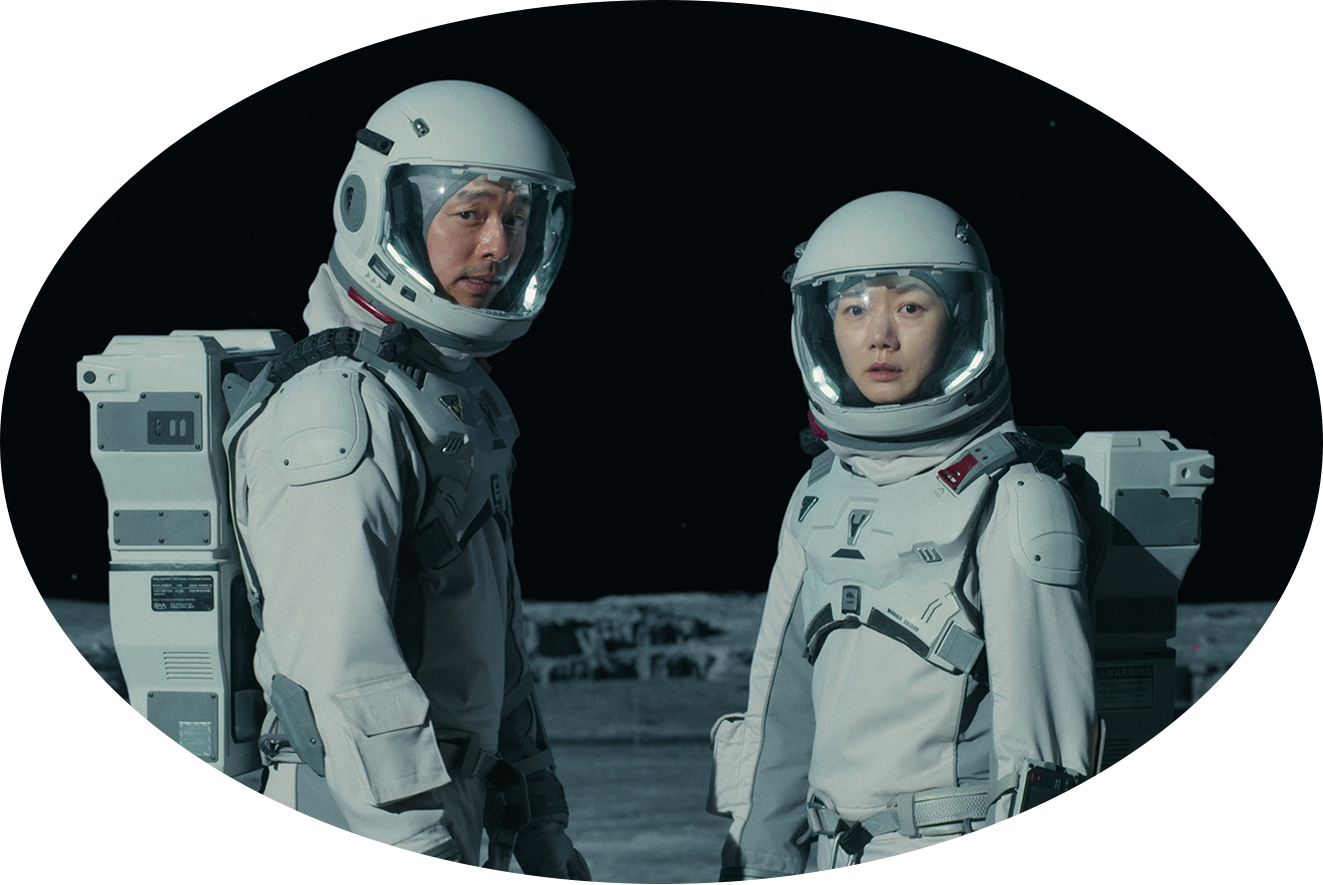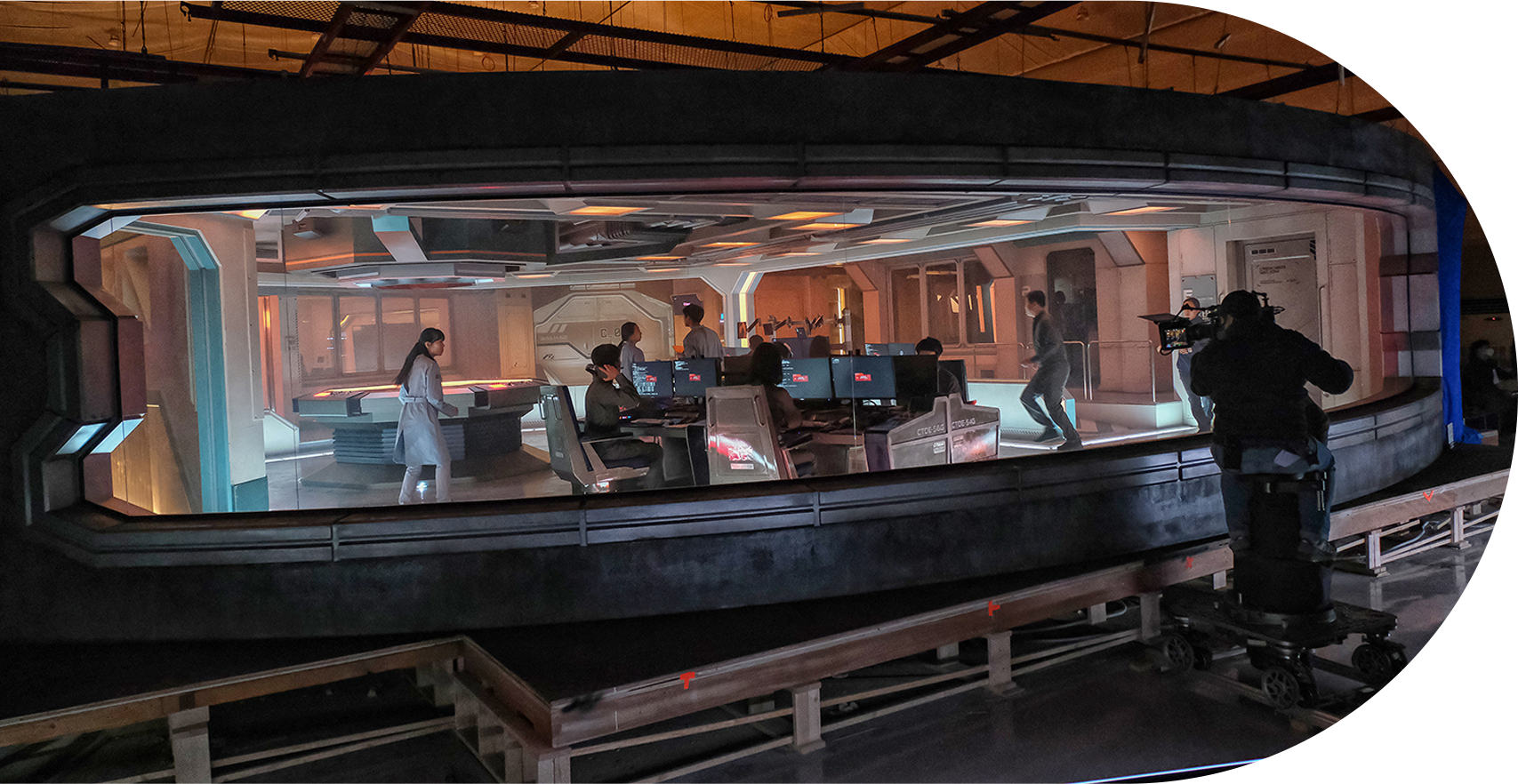A Justification for
‘The Silent Sea’

WRITTEN BY
Ahn Soong-beum,
film critic, professor at Kyung Hee University and director of the K-Cuture·Story contents Research Institute
Photos courtesy of
Netflix
The success of “Squid Game,” has sparked growing interest in new Netflix original series produced in Korea. One of these, “The Silent Sea,” is gaining considerable attention since it is a science fiction series-something of a rarity in the Korean market-and leading Korean actor Jung Woo Sung participated in its production. Expectations for the series were high even before its release thanks to its all-star cast familiar to audiences both in Korea and abroad, including Gong Yoo and Bae Doona. After its release, however, many reviewers have concluded that the new series is a failure.
However, is it appropriate to lump “The Silent Sea” into the “failure” column just because it was not a hit?
Nods to Familiar Tropes
The title of the series, “The Silent Sea,” provides a hint―ambiguous though it may be―to the show’s genre. The series is set in the near future when all Earth’s water has dried up, leaving nothing left alive on the planet. The show starts with people demonstrating against a “law for the equal distribution of drinking water” along with scenes showing the activities of the “National Committee for Survival Measures.” “The Silent Sea” paints a picture of a desperate world divided into those who have ownership of and access to water and those who do not. Scenes of a completely dried up Hangang River and a ruined city are shot in sepia tone to emphasize humanity’s dismal prospects for survival. The show then moves to the moon, where an even more shocking scene awaits. Unlike many science fiction series, where the Earth is shown as a beautiful azure globe, “The Silent Sea” portrays the planet with reddish, brown-colored spots. The scene puts the show firmly within the post-apocalypse category of the larger science fiction genre. The show’s producers aimed to turn Earth into an unfamiliar, closed-off space, before using a gradual decline into disorder to paint a picture of a world that will eventually cease to exist.
“The Silent Sea” includes a nod to bio-piracy, which is a feature of many science fiction stories. The series increases viewers’ sense of tension by connecting bio-piracy with a national conspiracy. In this narrative, government organizations are portrayed as making unethical choices in the global battle to monopolize alternative energy. Indeed, the dark secrets surrounding Neon Genesis Evangelion’s secret society of “SEELE”―and the cataclysmic “Second Impact” they are trying to hide―could easily be replaced with this show’s portrayal of the Korean Space and Aeronautics Division and the leak of radioactive material from its Balhae Lunar Base five years in the past.

‘The Silent Sea’ depicts a team on a special mission to an abandoned lunar base.
Deep Mysteries
The second meaning of the series’ title is even more explicit: it is an easily understood metaphor of the black plains of the moon. The “black areas” portrayed in the show are a nod to the show’s mystery, which centers on a massive secret and conspiracy. The drama’s plot remains loyal to the mystery genre as more information is provided about a mysterious event that occurred. “The Silent Sea” provides several plot lines to immerse the viewers emotionally into what is going on, limiting the information they have to work with so as to spark their curiosity. Viewers have no idea what happened at the Balhae Base five years ago until they are well into the series. Just like the fruit of the Tree of Knowledge, or the “One Ring” of the Lord of the Rings series, viewers are left confused about how they are supposed to view “lunar water.” Viewers are also forced to think hard about the identity of “Luna 073,” who is presented as a mysterious character. In short, “The Silent Sea” demands that viewers think about what they do not know with the limited information they are given.

‘The Silent Sea’ depicts a team on a special mission to an abandoned lunar base.
The mix of genre-related strategies used in the series shines particularly during the scene of rivalry between the government (the Korean Space and Aeronautics Division) and the personal stories and private passions of the space explorers who went to the Balhae Base. These scenes form the show’s pillar of experience, or pathos. Indeed, the show uses a two-pronged process of “persuasion through cause and effect.” For example, Song Ji An (played by Bae Doona) has emotional troubles due to her relationship with her older sister; yet, this acts as the show’s pillar of logic and reasoning, or logos. Song’s attempts to solve the mystery behind the lunar water, the identity of Luna 073, and the mystery surrounding what happened to her older sister―who was a head researcher at the Balhae Base―all serve to create a deductive narration that feeds into the show’s “source of mystery,” “suspense” and “surprising conclusion.” At the beginning of the narrative, Song’s exhaustive search for the Balhae Base’s data storage facility serves―in accordance with the genre―as the show’s MacGuffin.
Han Yoo Jae (played by Gong Yoo), who makes every effort to stay loyal to the official duties given to him by the Korean Space and Aeronautics Division, serves as the show’s pillar of ethos, or moral beliefs. He is portrayed as an elite soldier who loyally follows his government’s orders, demonstrates leadership as the head of his team, and shows a sense of responsibility as the father of a child. Throughout the important parts of the drama’s narrative, the ethical and moral stands he takes serves as a tool to build sympathy and trust toward him from the audience.

Scenes from ‘The Silent Sea.’
Reflecting on Our Inner Monster
All in all, “The Silent Sea” tries to captivate its viewers by starting out firmly nestled within the science fiction genre before shifting to the mystery genre. The series does not shy away from the liberal use of features from the horror genre, either. The space explorers must complete their missions at the deserted Balhae Base in a limited amount of time within the vacuum of space. There are a series of unexplained deaths, and they must also combat an unknown substance―lunar water―that multiplies at a frightening pace when it comes into contact with living organisms. All of this is a nod to the fear experienced by viewers living in a world plagued by the COVID-19 pandemic. When Luna 073 first appears, she is portrayed like a monster or ghost. She criticizes humanity for spoiling its natural environment under the false assumption that it is the universe’s superior race. She attacks the “selfishness” of human beings, who have used technology as a tool to enjoy god-like power and freedom; indeed, she forces us to gaze at our “inner monsters.” The image of eyes she paints on the ceilings throughout the Balhae Base could, in fact, be a demand for humans to reflect on their actions. Ultimately, Luna, who, in essence, is a secret code left behind by Song’s deceased older sister, forces us to confront our distorted desires.

Scenes from ‘The Silent Sea.’
Other Articles
-

Special Ⅰ Playground for the Arts
-

Special Ⅱ An Industrial Zone Revived
-

Trend Old Warehouses, New Faces
-

Hidden View Colorful Ocean
-

Interview Soprano Seo Sun Young
-

Art of Detail Magic Beasts
-

Film & TV A Justification for ‘The Silent Sea’
-

Collaboration Harmony Between Familiarity and Novelty
-

Current Korea Korea’s New Year Goals: Recovery and Peace
-

Global Korea Opening Ceremony of the Korean Cultural Center
